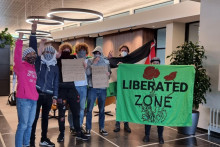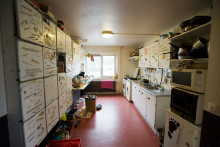Communication Studies student Eliana Piemonte advocates compiling a handbook in her graduation research presented last Friday. Piemonte based this and other recommendations, which should amongst others lead to a better integration of foreign students at the UT, on the results of an inquiry she held among a representative part of the 543 foreign students at the UT. The Argentinian Eliana Piemonte took a Master's course at Communication Studies. Alongside her study she worked as a reporter for this UT-Nieuws page. She acquired journalistic experience at a daily newspaper in her home country.
Piemonte observes that the UT does not succeed in bringing the campus facilities (sports, culture, courses) to the attention of the largest part of the foreigners: 57% of them does not use the facilities at all and 67% of the students who do say that they got wind of this through colleagues or friends, not through UT-publications. Anyway, thirty percent of the foreigners says to feel no need to take part in campus life.
The weekly English page in UT-Nieuws is the most important source of information for foreigners at the UT, the research shows. 47% always reads the page and 35% reads it occasionally. The International Office website is the least consulted medium, but the IO e-mails have a large attention value.
Printed information and announcements by e-mail turn out to be the favourite media of the foreign students on campus. Websites meet their needs to a lesser degree, but that can also be accounted for by the - according to users - scattered structure and inadequate content of the available digital information. An overview of all informaton in English on one recognisable starting page with links to the right sources would already be an enormous improvement, Piemonte's research shows.
The Dutch language remains a large obstacle in supplying information to international students. Even though most foreigners (85%) took a Dutch course, that did not help most of them: they still do not understand anything in Dutch. UT-information sent exclusively in Dutch, which happens regularly, is wasted on them.
Consequence of this (permanent) language deficiency is amongothers that this category of guest students does not know what to do with application forms for health insurance and a residence permit. According to Piemonte Enschede is one of the few cities where the aliens' police only supplies forms in Dutch. The UT can fill this gap by making an English language available.
Collecting all the necessary and desired information in the form of a handbook for foreigners at the UT is desirable according to Piemonte. This book should be made available both in printed and in digital form. When compiling this handbook the information needs not yet met should expressly be taken into account. Those polled mention as examples everyday subjects like housing, health insurance, medical services, public transport, second-hand shops and the use of campus facilities. Tourist information on the Netherlands also scores high on the wish-list, besides knowledge of Dutch culture and habits.
Eliana Piemonte would like to thank all the students who participated in this inquiry for their help.







